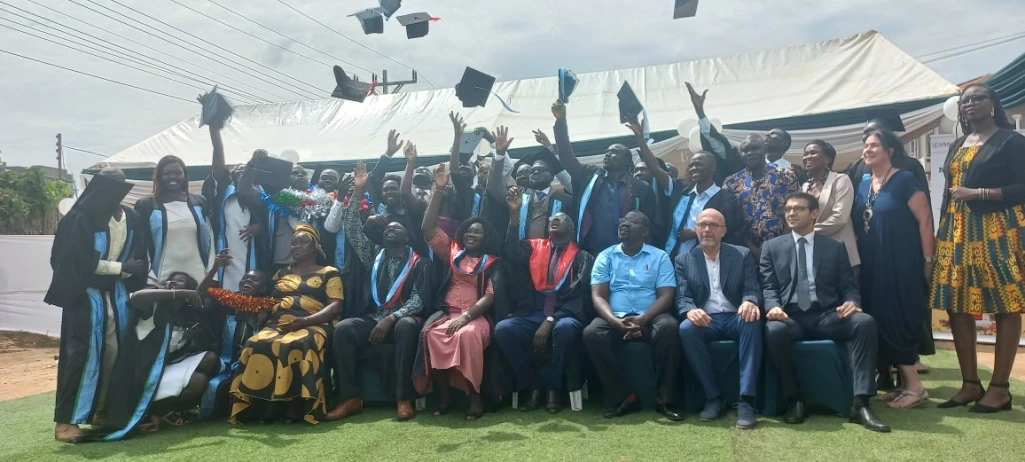
Due to lack of legal registration and budgetary challenges,
the Media Authority has suspended the Media Development Institute (MDI), a
journalism training program of the Association for Media Development in South
Sudan (AMDISS).
The institute offers one-year advanced certificate in journalism
and usually opens intakes in August, but it has not opened the intake for
cohort 8th this year due to challenges related to funding and
its registration as a higher learning institution.
Josephine Achiro, Chairperson of the Association for Media
Development in South Sudan (AMDISS), in an exclusive interview with The Radio Community on Tuesday, expressed her concerns but remains hopeful
that the challenges will be addressed.
“We have received a letter from the Media Authority
suspending the operation of the Media Development Institute,” said Achiro.
“But to me, that’s just part of the challenges; we are
engaging the Media Authority in discussions, and we are not seeing any big
threat from that because MDI is an academic institution. So, the only body that
will suspend an academic institution is the Ministry of Higher Education, not
the Media Authority.”
She argued that the Media Authority cannot suspend an
academic institution, stating that only the Ministry of Higher Education has
the authority to suspend MDI.
However, Elijah Alier, managing director of the Media
Authority, told The Radio Community that the institute has complied with the suspension,
emphasizing that it has not met standards set by the National Council for
Higher Education.
“Media Development Institute has complied with the
suspension, and they are looking forward to getting registration from the
National Council for Higher Education,” Alier said.
“If they meet the requirements of the council, they will
come back and get an operation license and can continue media training.”
Alier emphasized that the suspension prevents MDI from
issuing certificates in order to safeguard student credibility.
“When you go to school, you go with the intention of
furthering your studies. So, if you are given a certificate, it should be
recognized in the country. You can upgrade, but if it’s not accepted, why do
you waste people’s time and resources? Isn’t it appropriate to do the right
thing?” Alier asked.
The Media Authority insists that without meeting the
requirements for formal recognition, MDI cannot continue to operate or issue
certificates to its graduates.
“We do not recognize certificates from the Media Development
Institute after suspending them,” Alier he reiterated. “There's no certificate
coming from them again.”
AMDISS Chairperson Josephine Achiro, however, refuted the
Media Authority's position on certificate recognition, stating that there would
be a need to engage with the Authority.
“Giving accreditation to journalists because of a
certificate can also be another problem. We can engage with them; we are
building South Sudan, and media is not exceptional for this,” said Achiro.
“We will have to engage them on accreditation, bringing in
the challenges, and I know they also know those challenges we have shared with
them in several meetings because if they go around in all those media houses,
most of these journalists that are giving services to the people of South Sudan
through media are products of the Media Development Institute.
“So, should we look into certificates, or should we look
into the quality of journalism that they are having because that was the
intention of AMDISS coming up with this institute?”
According to AMDISS, the main reason the institute has not
admitted new students is due to funding constraints, as the partners that were
supporting the institute have halted their support.
“We haven't started a class, nor have we advertised for new
intakes. The reason is that currently we are facing funding challenges for MDI.
MDI has been operating with support from partners, mainly. I can say almost 95%
of MDI's operations are from donor support,” said Irene Ayaa, Executive
Director of AMDISS.
She further explained the institute's dependence on external
funding and revealed that there are ongoing efforts to establish MDI as a
private institution, where students will be required to pay full tuition fees,
similar to other higher learning institutions.
“We are just working out something because we also do not
want to depend on donors totally. So, we have been thinking of increasing the
tuition for students so that they themselves can contribute to the training,”
Ayaa said.
This financial strain has further complicated the
institute's ability to meet regulatory demands, even as it seeks to maintain
its commitment to training the next generation of South Sudanese journalists.
To fully register as an independent academic institution,
the registering authority requires the institution to pay a $50,000 fee and own
land measuring 500 by 500 meters.
The Media Development Institute is at a critical juncture
due to the suspension, financial challenges, and registration issues.
With the Media Authority's insistence on regulatory
compliance and the growing need for sustainable funding, the future of the
institute remains uncertain.
For now, the leadership of MDI and AMDISS continues to
engage with the relevant authorities, hoping to resolve the impasse and secure
the necessary accreditation from the National Council for Higher Education.
However, with financial challenges looming, the path forward
for MDI will likely require both regulatory cooperation and innovative funding
solutions to sustain its mission of training quality journalists in South
Sudan.
The Media Authority has acknowledged that the Media
Development Institute has produced nearly 90% of South Sudan's practicing
journalists since its founding in 2015.
However, due to the current impasse, the authority stated that it will not accredit certificates from the Media Development Institute unless it meets the required standards.